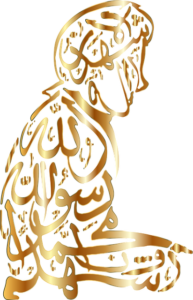
A study of the qualities of the character of ‘Uthmaan that made him such a tremendous benefit for Islam
Ulama Institute #1
Looking to learn Arabic or memorize the Quran?
Check our Trusted Teachers

- Before the advent of Islam, most rich men were not known to be generous to the poor and needy. It is only through Islam that the rich learned to give charity to the poor. ‘Uthmaan ibn Affaan who tasted the riches of life, both during the pre- Islamic and Islamic periods, was not like other men who collected money to enjoy the pleasures of this life. ‘Uthmaan came from a very wealthy family, yet he was different from other boys from rich families. He could not enjoy the things around him while seeing other people suffer. When he grew up he never missed a chance to help the poor and needy. Ibn ‘Umar narrated:
“During the lifetime of the Prophet ﷺ we considered nobody as equal to Aboo Bakr and then “Umar and then ‘Uthmaan [coming next to him in superiority], and then we used not to differentiate between the Companions of the Prophet.” [Al-Bukhaari] - Even though he owned so much material wealth, ‘Uthmaan was very modest and caring. ‘Aa’ishah narrated that the Prophet ﷺ spoke about ‘Uthmaan and said: “Shall I not feel shy from whom the angels feel shy?” [Muslim]
The two ahaadeeth that have been mentioned, indicate the high regard in which ‘Uthmaan was held by those around him. It also clearly shows how important a person’s good qualities are and that these qualities are favored by Allah. ‘Uthmaan was also known as Dhu An-Noorayn (the one who has two lights). He was given this title because he married two daughters of the Prophet ﷺ . - Uthmaan married the Prophet’s daughter Ruqayyah. During the time of the Battle of Badr, Ruqayyah fell ill and died. Thus, ‘Uthmaan was asked by the Prophet ﷺ to marry his second daughter Umm Kulthoom.
Uthmaan accepted the Prophet’s offer and the couple were married. Since that time, ‘Uthmaan was known as Dhu An-Noorayn. - ‘Uthmaan spent the nights praying to Allah and the days spending his wealth to satisfy the needs of the poor. ‘Uthmaan was able to assist in the spread of Islam and supported the Muslims during times of hardship because he had the necessary wealth and possessions to do so. He had no concern for worldly gains such as wealth and power. Instead, his only concern was to do everything to please Allah and to serve the religion of Islam. ‘Uthmaan was a simple man who never spoke about his wealth nor sought appreciation from the people. He was a patient man who was ready to make sacrifices at any time in the name of Islam. He always displayed a steadfast character and gave his entire life to the cause of Islam. The role that ‘Uthmaan played in assisting Islam has been mentioned many times. Once he accepted Islam, he used everything that he owned to assist the preservation and spread of Islam. After the Prophet’s uncle, Aboo Taalib, died, the people of Quraysh plotted to kill the Prophet ﷺ . Aboo Taalib was the Prophet’s only support and his death led to great difficulty in Makkah. Quraysh cut all ties and relations with the Muslims and isolated them in a valley far from any outside help. ‘Uthmaan was among the Muslims isolated by Quraysh. He did his best to ease the suffering. He ordered his agents to buy food and bring it secretly to the Muslims. This shows the noble qualities that ‘Uthmaan possessed and the way in which he opened his heart to those who were in distress or desperate need.
- The Muslims were very poor in Madeenah. They had left all their wealth, such as property and flocks, in Makkah. Their supporters in Madeenah shared all their resources with them.
- The owner of a well sold water to the inhabitants of Madeenah at a high price. The people of this place complained to the Prophet ﷺ about the high price that this man was charging. ‘Uthmaan felt very sorry for them when he heard their complaints. He then decided to do something to solve the problem. He went to the owner of the well and offered him a high price for it. The man, however, refused to sell the whole well and offered to sell half of it to ‘Uthmaan. The supply of water was divided between the two parties on a daily basis. ‘Uthmaan would use the well one day and the man would use it the next. ‘Uthmaan asked the Muslims to take enough water for two days. When it was the man’s day to sell water, no one would go to him to buy it. Finally, he sold the second half of the well to ‘Uthmaan. ‘Uthmaan allowed the Muslims to take water freely after that.
Anyone would think that a man who had all this wealth could surely have led a life of ease. However, ‘Uthmaan spent his wealth to provide food for the people while he was satisfied with less. ‘Uthmaan was a man who searched for things that were much greater than worldly pleasures. This was the essence of the noble qualities which he possessed.
What we learn from the lesson:
- In the Arabian Peninsula during the times of the Prophet ﷺ , rich people were very few in number.
- ‘Uthmaan ibn ‘Affaan was a rich merchant who cared about the well-being of others.
- He never missed a chance to help the poor and needy and always opened his heart to them.
- Even though he owned so much material wealth, ‘Uthmaan was very modest and caring.
- ‘Uthmaan played a major role in assisting Islam.
- He searched for things that were much greater than worldly pleasures.
- He spent his nights praying to Allah and his days spending his money to satisfy the needs of the poor.
‘Uthmaan : His Khilaafah
The Election of ‘Uthmaan as the khaleefah .
The pledge of allegiance (bay’ah) to ‘Uthmaan .
- ‘Umar ibn Al-Khattaab was on his deathbed and he was asked to name a successor. This was not an easy task because the small state of Islam had now expanded into an Empire. Islam’s purpose was to guide and reform people rather than subdue them. The khaleefah to come would have to protect and promote the religion in addition to fulfilling his administrative and military responsibilities.
- ‘Umar chose a council of six men to name a khaleefah from among their members. The members were: ‘Ali ibn Abee Taalib, ‘Uthmaan ibn ‘Affaan, ‘Abdur- Rahmaan ibn ‘Auf, Az-Zubayr ibn Al-Awwaam, Talhah Ibn ‘Ubaydullaah and Sa’d ibn Abi Waqqaas. ‘Umar asked them to complete the task within three days after his death. The five members met, (Talhah was not present in Madeenah) and two days were spent in unsuccessful attempts to select the khaleefah. ‘Abdur- Rahmaan ibn ‘Auf offered to withdraw his name and then have the right to nominate the khaleefah. All the other members agreed to this decision. ‘Ali agreed when ‘Abdur-Rahmaan promised to be fair and just.
- The election of the khaleefah now rested with ‘Abdur-Rahmaan ‘Abdur-Rahmaan held talks with many people of sound judgement. He met each person in private. ‘Uthmaan suggested ‘Ali, ‘Ali suggested ‘Uthmaan. Az-Zubayr suggested ‘Uthmaan or ‘Ali, and Sa’d suggested ‘Uthmaan .
- Later, the only candidates that remained were ‘Ali and ‘Uthmaan. On the night before the day of announcing the decision, the members of the council again assembled. ‘Abdur-Rahmaan met Az-Zubayr and Sa’d separately in private and told them that most of the people favored ‘Uthmaan or ‘Ali. Both of them also favored the people’s choices. ‘Abdur-Rahmaan then talked to ‘Uthmaan and ‘Ali separately. The night ended and after the Fajr prayer, the masjid was crowded with people. Everyone eagerly awaited the announcement by ‘Abdur-Rahmaan Ibn ‘Auf. ‘Abdur-Rahmaan stood up. For a few minutes he prayed to Allah to guide his thoughts and intentions.
- He told the people that he had given the matter a lot of thought and that he had spoken to many people to have their opinions. He also expressed the hope that no one would differ with his decision. Then ‘Abdur-Rahmaan called ‘Uthmaan and told him to promise everyone that he would act according to the laws of the Qur’aan and the example set by the Prophet and the two khulafaa’ before him. ‘Uthmaan promised everyone present that he would do what was asked to the best of his ability. ‘Abdur-Rahmaan announced that ‘Uthmaan had been chosen as the new khaleefah of the Muslims.
- ‘Abdur-Rahmaan ibn ‘Awf was the first person to pledge his allegiance to ‘Uthmaan and the other people followed suit. ‘Ali passed through the people and took the pledge of allegiance. Talhah was not present on this occasion and could not be part of the decision-making process. When Talhah called on ‘Uthmaan to pledge his allegiance, he was told that ‘Uthmaan had been elected in his absence. ‘Uthmaan offered to give his position to Talhah if he was upset by the decision. Talhah stretched out his hand and took bay’ah at the hands of the new khaleefah of the Muslims.
- At the end of the bay’ah session, ‘Uthmaan ibn ‘Affaan came forward and addressed the congregation. He asked them to continue doing good deeds in the name of Islam. He also asked them to fear the evil effects of abundant wealth and reminded them to keep the pleasure of Allah in view. After speaking to the people who were present, ‘Uthmaan issued an order in the name of the governors and officers by which he mentioned the end of the khilaafah of ‘Umar and his own election as the khaleefah. He asked everyone to work with honesty and in good faith. Everyone present pledged loyalty to the new and third khaleefah ‘Uthmaan ibn ‘Affaan.
- Through his manner and character, ‘Uthmaan endeared himself to the people. He had great love for the Prophet and this showed in his actions and dealings with people. He took the Prophet’s teachings as a source of guidance and acted with patience and an unshakeable belief in the laws of Allah. During his period of rule, he did not take any salary for the position. He continued to live a simple life, even after he became the khaleefah.
What we learn from the lesson:
- ‘Umar ibn Al-Khattab on his deathbed wanted a successor to be chosen.
- A council of six men was chosen to name a khaleefah.
- The final choice of the khaleefah rested with ‘Abdur-Rahmaan ibn ‘Awf
- ‘Uthmaan ibn ‘Affaan was chosen as the third khaleefah of the Muslims.
- Everyone present pledged their allegiance (bay’ah) to the new khaleefah.
- ‘Uthmaan took the Prophet’s ﷺ teachings as a source of guidance and acted with patience and unshakeable belief in the laws of Allah ﷻ .







